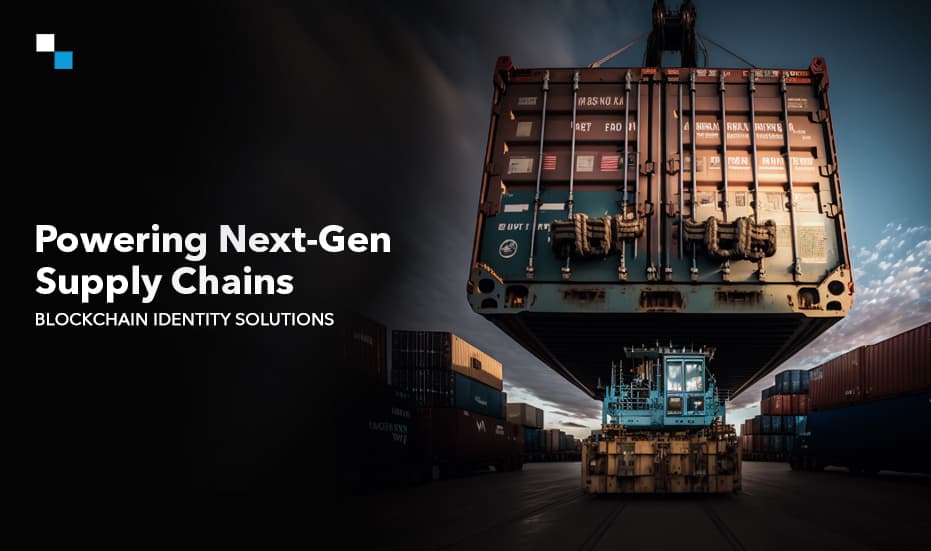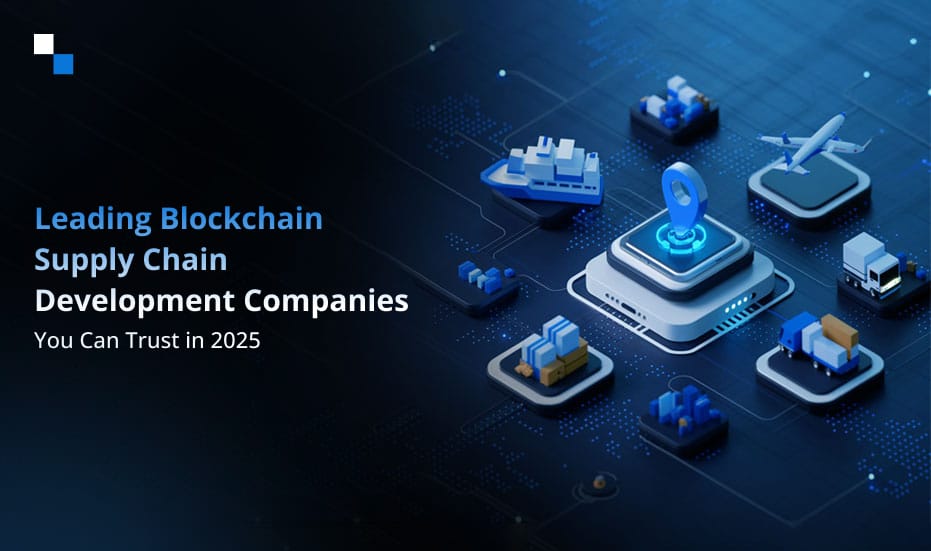
How to Make Money with White Label DeFi Wallet: Top 7 Ways Decoded
February 26, 2024
A Comprehensive Guide to Asset Tokenization Regulations for Australian Businesses
February 27, 2024The hum of the global market for supply chain management hides vulnerability: projected to nearly double, reaching approximately 31 billion U.S. dollars by 2026. This complex web of producers, manufacturers, and consumers deserves a secure and transparent solution, and that’s where blockchain steps in. Blockchain-powered digital ID solution ensures every product possesses a unique, tamper-proof digital identity. It is a secure, decentralized ledger, where each product’s journey is meticulously tracked, eliminating counterfeits and building consumer trust.
Additionally, this allows faster customs clearance, automated payments, and optimized logistics with unprecedented visibility. However, the benefits extend far beyond efficiency. With blockchain, ethical sourcing becomes a reality, waste reduction is achievable, and consumers gain the power to make informed choices. Regulatory compliance transforms into a breeze, and global trade thrives on transparency and trust.
Explore how blockchain identity solutions are revolutionizing the way our interconnected world operates. Before that, understand the challenges of the traditional identity systems in the supply chain industry, and how this blockchain software overcomes these challenges, its operation, and its future.

Pain Points of Conventional Identity Management in the Supply Chain Industry
Supply chain and logistics industries are the critical drivers of global commerce. However, this industry’s traditional identity management systems have faced several challenges of trust and transparency, making it difficult to track goods and materials throughout the process. Let us check the various challenges faced by the industry to clearly understand how blockchain-based digital identity platforms can solve the challenges.
- Lack of Transparency- Traditional paper-based systems and siloed data made it difficult to track goods and materials throughout the supply chain, resulting in difficulties in identifying bottlenecks and inefficiencies, increased risk of fraud and counterfeit products, and challenges in ensuring compliance with regulations and ethical sourcing practices.
- Data Security and Tampering– Sensitive information like product specifications, certifications, and ownership records were vulnerable to manipulation and unauthorized access, leading to increased risk of data breaches and financial losses, difficulties in verifying the authenticity and provenance of products, and loss of trust between stakeholders.
- Inefficient Processes and Manual Work- Conventional documentation and manual verification of documents led to slow and cumbersome processes, high administrative costs, and human error, as well as difficulties in managing complex international transactions.
- Devoid of Trust and Collaboration- The opaque nature of traditional supply chains made it difficult for stakeholders to trust each other, resulting in poor communication and collaboration, difficulties in resolving disputes and managing risk effectively, and missed opportunities for joint optimization and innovation.
- Difficulty in Achieving Compliance- Verifying compliance with regulations and ensuring ethical sourcing practices was often a complex and time-consuming process due to the lack of readily available and verifiable data, challenges in tracking goods and materials across multiple jurisdictions, and increased risk of fines and reputational damage for non-compliance.
This is exactly where Blockchain identity management comes into a pivotal role. It offers solutions to these challenges by providing a secure, transparent, and tamper-proof platform for managing identities and data throughout the supply chain. Scroll down to read more about how these identity solutions are addressing the conventional identity systems in better ways-
Blockchain Identity Solutions: Conquering the Supply Chain’s Challenges
As per a few reports, the data breach in the supply chain industry has increased by 37% which is quite alarming and shows that giant businesses must work on their supply chain security. Traditional identity management in supply chains grapples with vulnerabilities and inefficiencies. Counterfeit goods, data breaches, and opaque records hinder trust and transparency. But blockchain-based digital identity platforms, with their inherent security and tamper-proof nature, emerge as a game-changer. Here’s how it tackles these challenges-
1. Transparency
- Immutable records- Every transaction and interaction is recorded on the blockchain, creating a single source of truth accessible to authorized parties. This eliminates opacity and provides real-time visibility into every stage of the journey, from raw materials to final delivery.
- Enhanced traceability- Each product and participant has a unique digital identity on the blockchain, allowing precise tracking of movement and ownership changes. This transparency facilitates identifying bottlenecks, preventing fraud, and ensuring compliance with regulations and ethical sourcing practices.
2. Enhanced Security
- Data encryption- Blockchain uses cryptography to secure data, making it virtually impossible to tamper with or manipulate. It protects sensitive information like product specifications, certifications, and ownership records, minimizing the risk of fraud, data breaches, and counterfeit products entering the system.
- Decentralized control- Data isn’t stored in a single, vulnerable location but distributed across the blockchain network. This decentralized approach makes it resistant to hacking and manipulation, enhancing overall data security.
3. Efficiency Emerges
- Smart contracts- These self-executing agreements automate tasks based on pre-defined conditions, eliminating manual paperwork and streamlining processes. Imagine automatic payments upon delivery, document verification, or inventory release based on specific criteria.
- Reduced administrative burden- By automating tasks and providing real-time data, blockchain reduces manual work and administrative costs, allowing faster operations and improved resource allocation.
4. Collaboration
- Shared platform- Blockchain creates a shared platform where all authorized participants can access the same secure and transparent data. It fosters trust, communication, and collaboration among stakeholders, leading to better information sharing, dispute resolution, and joint optimization opportunities.
- Role-based access control– Each participant has varying levels of access to data based on their permissions, ensuring only authorized parties can view sensitive information. This protects trade secrets and privacy while facilitating collaboration within the network.
5. Seamless Compliance Management
- Verifiable data- All data on the blockchain is tamper-proof and readily available, simplifying compliance checks and audits. Regulatory bodies can easily access necessary information, reducing the risk of fines and reputational damage for non-compliance.
- Transparent sourcing- By tracking the origin and movement of materials, blockchain promotes ethical sourcing practices and helps companies comply with sustainability regulations.
Digital identity solutions based on blockchain networks act as a powerful force for goods in the supply chain. It has paved the way for more of a secure, faithful, and efficient future for supply chain businesses by tackling transparency, security, efficiency, collaboration, and compliance challenges. If you wish to develop such solutions to streamline your business, then you must connect with a prominent blockchain identity management company. They house qualified experts who are well-versed in designing solutions tailored to your business requirements.
How Do Blockchain Identity Platforms Operate In The Supply Chain Industries?
In supply chain industries, digital identity management platforms operate by creating unique digital identities for all participants and products involved. These identities are essentially secure, tamper-proof records stored on a distributed ledger, accessible only to authorized parties. Here’s how it works-

- Identity Creation- Each participant (supplier, manufacturer, distributor, etc.) and product receives a unique, verifiable identifier (usually called a DID) on the blockchain. This DID is a digital passport, containing relevant information like company details, product specifications, certifications, and ownership history.
- Secure Data Management- All transactions and interactions within the supply chain are recorded on the blockchain, and linked to the corresponding DIDs. This data is encrypted and cryptographically secured, making it virtually impossible to tamper with or forge.
- Access Control and Permissioning- Each participant has varying levels of access to data based on their role and permissions. This ensures that only authorized parties can view sensitive information, protecting trade secrets and privacy.
- Smart Contracts for Automation- Smart contracts, self-executing agreements written on the blockchain, can automate tasks based on pre-defined conditions. This can include triggering payments upon delivery, verifying customs documents, or automatically releasing inventory when certain criteria are met.
- Enhanced Traceability and Transparency- The entire journey of a product, from raw materials to final delivery, is documented on the blockchain. This provides real-time visibility into every stage, enabling stakeholders to track progress, identify bottlenecks, and ensure compliance.
Future Nexus: Blockchain Identity Management in The Supply Chain Industry
Blockchain-based digital identity solutions offer transformative potential in the supply chain landscape. Picture a future where each product boasts a distinctive digital identity, seamlessly integrated into a dynamic network. Supply chains become agile and personalized, responding in real-time to consumer demands while minimizing waste and optimizing resources. Consumers enjoy tailored experiences, accessing detailed information about product origins and sustainability.
Blockchain identity solution’s robust security fortifies the ecosystem against fraud, ensuring authenticity and trust. Transparency becomes paramount, driving ethical sourcing practices and fostering collaboration in decentralized ecosystems. Moreover, regulatory compliance is streamlined through automated processes, facilitating global trade and enhancing consumer trust. While challenges like scalability remain, the promise of blockchain-driven innovation in supply chain and logistics is undeniable. As technology matures and collaboration deepens, this future promises a sustainable industry where every interaction is elevated by blockchain’s transformative power.

Shake Hands With A Blockchain Identity Management Company
The current identity systems of global supply chains are riddled with vulnerabilities and inefficiencies. Blockchain, with its inherent security and transparency, presents a pivotal solution- digital identity management. This transformative technology is poised to rewrite the industry’s identity narrative, unlocking a future of unparalleled trust, visibility, and efficiency.
Are you planning to invest in blockchain-powered digital ID solutions for your business? Antier is your reliable ally. We are a leading blockchain identity management company that pledges to deliver exceptional platforms that help you easily manage, secure, and verify shared data or sensitive information. Whether it is supply chain logistics, or any other industry, the adept blockchain professionals of our company are well-versed in designing relentless and impeccable solutions on any leading blockchain platform.



